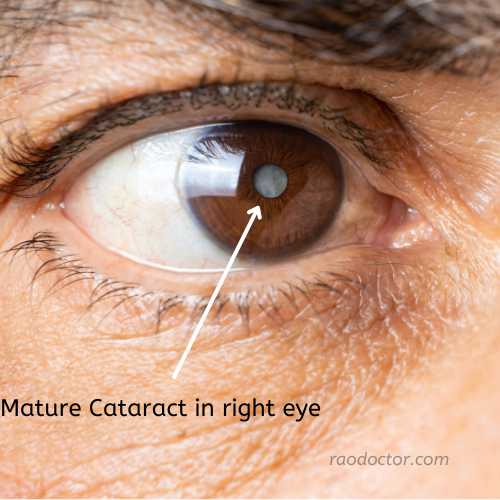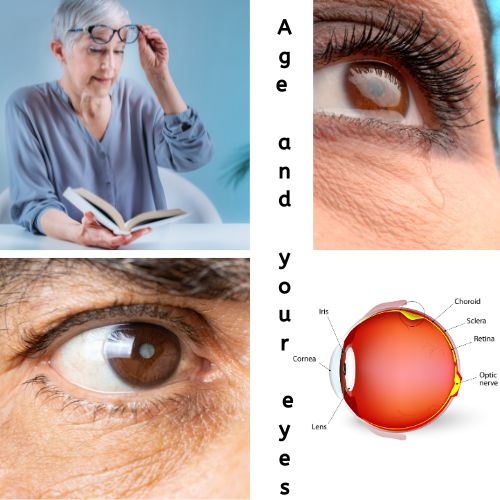In my previous article, I had mentioned that I will be publishing an article on Retinal Detachment. But, I thought, if you could learn a little bit about the problems affecting your eyes as we age, you will be in better position to understand retinal detachment.
Did you know that your eyes can reveal a lot about your age? If you are one of those who think that the eyes are the window to the soul, then you will be surprised to know that even your eyes have secrets.

The condition and appearance of your eyes can tell a lot about how old you are. Let’s take a look at some eye problems that might develop if you are getting older.
In this article, we will touch upon eye disorders in brief. Later on, we will take upon each problem individually in detail in my future articles.
Dry Eye Syndrome
Our eyes are kept by a fluid called tears, produced by a gland called Lacrimal Gland, in the eyelids. Tears that are produced have three layers:
- water,
- oil, and
- mucus.
They help keep your eyes moist, smooth, and clear.
Dry eyes can happen when you don’t produce enough tears or the quality of your tears is poor23. Some common causes of dry eyes are:
- Aging
- Being a woman
- Certain medications– like those used to treat allergies, cold
- Environmental factors– like weather, dust, some medical conditions like rheumatoid arthritis, etc.
- Hormonal changes– like in thyroid disease [exophthalmos in hyperthyroidism] and menopause.
- Meibomian gland dysfunction.
Dry eye syndrome can be a condition that will develop as you grow older. It is a very common condition that often goes undiagnosed because many people don’t even realize they have it.
Dry eye syndrome occurs when there is a lack of tears to keep your eyes hydrated. Tears are created by an organ called the lacrimal gland which is located in the eyelid. The gland has to create a constant supply of tears to keep the eye hydrated.
Most common cause of dry eyes- continuous gazing at electronic items like your smart phone, TV screen, Computer screen.
As we age, especially after the age of 35, the lacrimal gland can become less efficient, resulting in a decrease in the creation of tears. This can cause the eye to become dry and irritated. In some cases, the eye may even become itchy.
Dry eye syndrome can cause blurry vision, difficulty reading and headaches. The symptoms of dry eye syndrome are not serious but it’s important to seek treatment from your eye doctor.
Presbyopia
When you are younger, you’re able to see objects close up and far away without any issue. However, as you get older, your eyes develop a condition called presbyopia.
Presbyopia is a natural condition that happens as we grow older. It is caused by the fact that the flexibility of the lens in the eye gets stiffer as we age. When you have presbyopia, you have a hard time seeing objects that are close up, like the words on a book or a computer screen.
You might find yourself holding things further from your face or using a magnifying glass to be able to see.
There are a few options for people who suffer from presbyopia. You can try wearing reading glasses, investing in a computer monitor that is larger, or getting LASIK surgery.
Macular Degeneration
One of the most common eye diseases, macular degeneration, is one of the leading causes of blindness among the elderly. In macular degeneration, the retina gets damaged, resulting in a loss of vision.
The retina is what allows you to see in the dark and have good vision in general. It is the most sensitive part of the eye and is responsible for processing images and transmitting them to the brain.
When the retina is damaged, you may experience blurry vision, a loss of color perception, hazy vision and even a blind spot in your field of vision.
There is no way to prevent macular degeneration, but you can get treatment to slow down the progression of the disease.
There are drugs that can be used to improve the health of the retina. There are also supplements that can be taken to reduce the risk of macular degeneration.
If you are concerned about macular degeneration, you should see an eye doctor for regular check-ups.
Glaucoma
Glaucoma is another eye disease that may develop as you get older. The disease damages the optic nerve, which can result in vision loss.
Glaucoma is a condition that damages the optic nerve of the eye, usually due to increased pressure inside the eye called intraocular pressure. This pressure is measured by using an instrument called Tonometer.
Increased intraocular pressure can cause vision loss or blindness if left untreated. Some possible causes of glaucoma are:
- Age over 55
- Family history of glaucoma
- Certain medical conditions, such as diabetes or high blood pressure
- Eye injury or infection
- Eye surgery
People who have glaucoma usually do not notice any symptoms until the disease has progressed. The key is to get regular check-ups with your eye doctor to make sure you are not developing glaucoma.
Anyone can get glaucoma, but it is most common in people who are over the age of 60. If you have been diagnosed with glaucoma, there are treatments available.
Some of the more common treatments include eye drops and medications. There are surgical options available as well.
However, it is important to get treatment as soon as possible to avoid further damage to the optic nerve.
You can learn more about this condition here- Glaucoma
Cataract
A common eye condition that often develops with age, cataract, is a clouding of the lens inside the eye. The lens is what allows us to focus on things close up and far away.

As we get older, the lens can become stiff and cloudy, making it harder to see. There are two types of cataracts:
- a congenital cataract, which is present at birth, and
- a senile cataract, which can develop as early as the 30s or 40s.
There is no way to prevent a cataract from forming. However, it is important to visit your eye doctor for regular check-ups so that a cataract can be diagnosed and treated as early as possible.
A cataract can be removed with surgery, but it is important to catch it before it becomes a problem, especially before it gets hyper-mature. A cataract will not hurt you, but it can make it hard to see.
Retinopathy
Retinopathy is an eye disease that can occur when there is a break in the retinal blood vessels. There are a few different types of retinopathies, but diabetic retinopathy is the most common.
If you have diabetes and you get regular check-ups with your eye doctor, you can catch retinopathy early and take care of it with treatment. Retinopathy is not something that needs treatment immediately. However, it is important to find out if you have retinopathy so that you can have your eyes examined by an eye doctor on a regular basis.
Just because you have retinopathy does not mean you will lose your vision. Retinopathy will gradually worsen over time, but you can take steps to slow down the progression of the disease.
You should see your eye doctor for regular check-ups so that the progression of the disease can be monitored.
Dark Circles Under Your Eyes
Age is not the only thing that can lead to dark circles under your eyes. In some cases, a health condition or even lack of sleep can cause dark circles under your eyes.
As you get older, your skin will become less elastic and begin to sag. This can cause the blood vessels under your eyes to become more prominent, which can make dark circles under the eyes more noticeable.
If you have dark circles that have been bothering you for a while, there are a few things you can do to try and remove them.
Some people find that drinking more water can help with dark circles because it can hydrate the skin. You can also try applying an eye cream that contains hyaluronic acid and vitamin C.
Conclusion
Your eyes can reveal a lot about your age, from the health of your eyes to the amount of sleep you are getting.
If you notice any of the eye problems above, make sure to see your eye doctor regularly so that they can be diagnosed and treated accordingly.
There are many ways to slow down the aging process, but there are also some things that you cannot control.
Age-related eye problems are something that everyone gets, regardless of how well they take care of their eyes. However, there are steps you can take to slow down the process.
We will learn about all these conditions in separate articles in my forthcoming articles, as and when they get published.
Final words
If you have found this article useful, please do me a favor by sharing it with your friends and relatives by using the icons at the bottom of the article- who knows they may find it useful too. Alternately, you can Click to Tweet-
What your eyes tell about your age: 4 Problems You May Develop as You Get Older Share on XMy next article will be on Retinal Detachment, a problematic condition that develops in diabetics, post cataract surgery and old age.
Adios.

